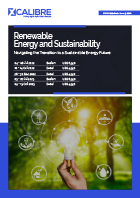| Date | Venue | Fee | |
|---|---|---|---|
| 29 Jun - 03 Jul 2026 | Boston - USA | $ 6,950 | Register Now |
| 05 Oct - 09 Oct 2026 | Dubai – UAE | $ 5,950 | Register Now |
| 21 Dec - 25 Dec 2026 | Dubai – UAE | $ 5,950 | Register Now |
About the Course
The global transition to a sustainable energy future has begun. Renewable energy is fast growing at an astonishing pace, information technologies are revolutionizing electricity trade and management, and competitive electricity markets are driving unprecedented change in electricity generation choice. These rapid changes create countless opportunities for those firms and individuals that understand how and why these changes are happening, anticipate where energy markets are headed, and innovate new solutions and approaches that meet energy-related needs. Conversely, the transition will leave behind those that fail to keep up.
Succeeding in this rapidly changing world requires a solid knowledge base in energy fundamentals, energy technologies, and energy markets; and the skills to use this knowledge to assess new business opportunities. This training course provides both that essential knowledge and those critical skills. After completing this training course, you will understand “why” the energy system is changing, “where” it is headed, “what” it means for your career and your firm, and “how” to successfully navigate the ongoing transition to a sustainable energy future.
Core Objectives
Upon successful completion of this course, the delegates will be able to:
- Assess why the energy system is changing, and what it means for you and your organization
- Quantitatively evaluate sustainable energy options including renewables, energy efficiency, and electrification
- Explain how information technologies are transforming the electricity system
- Analyze how policies such as auctions and energy targets can be leveraged for success
- Assess and interpret trends and forecasts that tell us about the future of energy
- Predict where the energy-related opportunities lie, and know how to take advantage of them
Training Approach
This training course will utilise a variety of proven adult training techniques to ensure maximum understanding, comprehension and retention of the information presented. This includes presentation and discussion of latest videos and technologies on smart grids and renewable energy.
Questions are encouraged throughout, particularly at the daily wrap up sessions. This provides opportunities for participants to discuss with the Presenter specific issues and, if possible, find appropriate solutions. Specific goals of each participant will be discussed to ensure that their needs are fulfilled whenever practicable.
The Attendees
This training course is suitable to a wide range of professionals but will greatly benefit:
- Those new to the energy industry, seeking a thorough understanding of renewable energy and sustainability
- Those in traditional energy firms, need to understand better what the energy transition means for their firm
- Those in the renewable and sustainable energy field, seeking market and technology intelligence on the latest happenings in the field
- Government and public sector professionals with responsibilities related to renewable and sustainable energy
- Advocates and civil society members, in pursuit of knowledge they can use to build a sustainable energy system for the future generation
Daily Discussion
DAY ONE: ENERGY FUNDAMENTALS
- Energy Problems and Solutions
- World Energy Overview
- Energy Fundamentals Review
- Country-Specific Energy Overviews
- Electricity Fundamentals
- Electricity Industry Structure
DAY TWO: RENEWABLE ENERGY TECHNOLOGIES AND TRENDS
- Renewable Energy (RE) Basics
- Renewable Energy (RE) Myths and Challenges
- Renewable Energy (RE) Technologies
- Economic Analysis of Renewable Energy (RE)
- Renewable Energy (RE) Forecasts and Scenarios
DAY THREE: DISTRIBUTED RENEWABLES AND GRID INTEGRATION
- Distributed Systems and Microgrids
- Rooftop Photovoltaics (PV) Technologies and Trends
- Rooftop Photovoltaics (PV) Case Study Analysis
- Grid Integration: Problem and Solutions
- Storage Technologies and Trends
- Hybrid Power Plants
DAY FOUR: INFORMATION TECHNOLOGIES (SMART GRID) AND ENERGY POLICY
- Electrification Trends and Implications
- Electric Vehicles as Distributed Storage
- Demand Response (DR)
- Energy Policy Levers and Tools
- Auctions
- Feed-in Tariffs and Net Metering
DAY FIVE: ENERGY EFFICIENCY AND SUSTAINABLE ENERGY FUTURES
- Energy Efficiency Overview and Technologies
- Megawatts: Theory and Practice
- Energy Efficiency - Business Models and Case Studies
- Elements of a Sustainable Energy Future
- Data Sources and Analysis Tools
Certificate Awarded
Upon successful completion of this training course, participants will be awarded a Certificate of Completion from XCalibre Training Centre, acknowledging their accomplishment. This certificate serves as a testament to their dedication to developing their skills and advancing their expertise in their respective fields.



